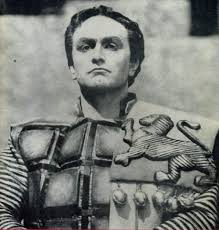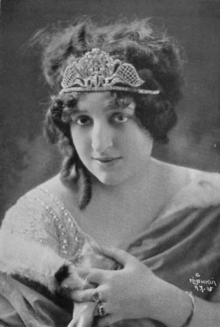|
SATURDEE OPRY LINKS 74:
Lesser Known
 
Ernest Blanc
Claudia Muzio
Saturdee Opry Links Overture!
Prelude, Act 3, "Lohengrin," by Wagner.
https://www.youtube.com/watch?v=iLIBaMceZQc
1.
There are lots of great opera singers who do not become household words, who are
"great," but do not have "greatness." Yet they go through their careers quite
laudably. One such excellent journeyman was Endrik Wottrich, a German Wagnerian
tenor who passed away recently from a heart attack at only 53---and who made
headlines for denouncing the stresses of the opera world, which, he said, was
rife with drug use and alcoholism. He was also the one-time paramour of
Katharina Wagner, the stage director who has desecrated many of her
great-grandfather's operas in Bayreuth. Here he is in an excerpt for "Walter's
Prize Song," from Wagner's comedic, moving paean to brotherhood, "Die
Meistersinger von Nuremburg."
https://www.youtube.com/watch?v=U-J1lTnYmCY
Role: Walter von Stolzing, a young knight from Franconia
Setting: a meadow outside of Nuremburg, Germany, mid-sixteenth century
Synopsis: Walter sings his Prize Song for the song contest. It is a beautiful
and magical piece which poetically describes his love for Eva.
Translation:
Most gracious day,
to which I awoke from a poet's dream!
The Paradise of which I had dreamed
in heavenly, new-transfigured splendour
lay bright before me,
to which the spring laughingly now showed me the path;
she, born there,
my heart's elect,
earth's loveliest picture,
destined to be my Muse,
as holy and grave as she is mild,
was boldly wooed by me
Obit:
http://www.roh.org.uk/news/endrik-wottrich-obituary
https://www.theguardian.com/world/2007/aug/19/germany.classicalmusic
Wottrich made headlines by claiming drug use and insane pressures are rampant in
opera.
"The stress levels are too high... the whole opera world is sick. There are
standards expected of us that are just not possible to realise," he said.
2.
Saturdee Opry Links doesn't get to Meyerbeer often, and here is one of his
operas that no one gets to often anymore, "L'Etoile du Nord" ("The North Star.")
It's a comic piece that has all but disappeared from the repertory, although one
bit of it survives as a concert piece. This aria---really an obligato for flutes
and soprano---is "C'est bien l'air que chaque matin" ("This is the air every
morning.") It was a great showcase for Jenny Lind, once upon a time. The story
involves to the love of Peter the Great for Catherine. Their union finally takes
place, but not until Catherine has disguised herself as a soldier and served in
the Russian camp. Natch. After surreptitiously watching Peter and a companion
drink and carouse in the former’s tent with a couple of femmes, Cathy becomes
appropriately deranged. Peter restores her calm and love by simply playing
pretty tunes on a flute. (I've tried this, too---it works.) Now, to the casual
ear, this is the kind of aria that brings to mind images of Curly Howard in
drag, which is perfectly fine, but it also brings to mind the acrobatic
coloratura of Sumi Jo, who executes this difficult, frilly showpiece here. Have
a ball.
https://www.youtube.com/watch?v=r9oQR-y1w9o
No translation available, and I doubt it would illuminate the proceedings.
3.
SOL also does not get to duets nearly enough, largely because on-line
translations are lacking. Got lucky with this English-captioned excerpt from
Mozart's late (and serious) opera, "La Clemenza di Tito." Here we have the
brief, exquisite duet, "Ah perdona al primo affetto," in which the characters,
Annio (trouser role, sung by a soprano) and Sesto, resolve their love.
https://www.youtube.com/watch?v=6grCU6-o6WQ
The sopranos are Kate Lindsey and Lucy Crowe.
About "Tito," From Wiki:
Alfred Einstein in 1945 wrote that it was "customary to speak disparagingly of
La clemenza di Tito and to dismiss it as the product of haste and fatigue," and
he continues the disparagement to some extent by condemning the characters as
puppets – e.g., "Tito is nothing but a mere puppet representing magnanimity" –
and claiming that the opera seria was already a moribund form.[8] However, in
recent years the opera has undergone something of a reappraisal. Stanley Sadie
considered it to show Mozart "responding with music of restraint, nobility and
warmth to a new kind of stimulus".
4.
"Romeo, Romeo, wherefore art thou, Romeo," does not mean, "Romeo, where are
you?" It really means, "why are you," that is, implicitly, "why do you have to
be a Montague?" But this curvaceous, plaintive aria, from Bellini's "I Capuleti
e i Montecchi," actually does ask, "Where are you, Romeo?" Sung here by the
tremendous Kathleen Battle, who reputedly did battle with anyone and everyone
around her throughout her career, and behaved with such condescension as to have
merited a rarity: open condemnation from colleagues. But she could sing purdy
good. Note: this aria, "O Quante Volte" ("How much time?") begins with a
"precede," as we used to say in newspapers, a kind of set-up for the melody.
https://www.youtube.com/watch?v=pJPqt_HhDOU
Setting : Giulietta's balcony in the palace of Capulet, Verona, Italy, 15th
century
Synopsis : Giulietta worries as she does not know where Romeo has gone. She is
in love with him and waits with ardor for him to come. She wishes to see his
silhouette in the light of the day and hear his sigh which reminds her of the
breeze.
Translation:
http://www.aria-database.com/translations/capuletti03_quante.txt
5.
Lincinio
Refice (1885-1954) was a priest who taught at the Scuola Pontifica for sacred
music in Rome for some 40 years. He died on the rostrum while conducting the
morning rehearsal of his own opera, "Cecilia" (with soprano Renata Tebaldi),
inspired by the life of music's patron saint. The words of 'Ombra di Nube' are a
prayer, a plea and a reminder of the eternal beauty that remains when the pain
goes. Here is the great soprano of the past, Claudia Muzio.
https://www.youtube.com/watch?time_continue=195&v=LVcIBzMgTaQ
Text and Translation:
Era in ciel un arco azzurro di fulgor;
chiara luce si versava sul mio cuor.
Ombra di nube, non mi offuscare;
della vita non velarmi la beltà.
Vola, o nube, vola da me lontan;
sia disperso questo mio tormento arcan.
Ancora luce, ancora azzurro!
Il sereno io vegga per l’eternità!
The sky was an arc of dazzling blue;
A brilliant light shone down on my heart.
Shadow of a cloud, do not bring me darkness;
do not obscure the beauty of life for me.
Fly, cloud, fly far away from me;
Let this strange torment of mine be swept away.
Bring back the light, bring back the blue!
Let me see the clear sky for all eternity!
About Refice:
https://en.wikipedia.org/wiki/Licinio_Refice
About Claudia Muzio:
https://en.wikipedia.org/wiki/Claudia_Muzio
6.
Wagner did what? He wrote a Romantic comic opera based on Shakespeare's "Measure
for Measure?" Called "Das Liebesverbot?" ("The Ban on Love.") No, I didn't know
this, either. (Wagner once referred to it as "the sin of my youth.") It was his
second opera, bearing lots of influence of Donizetti and Bellini (whom he
greatly admired.) Yes, long before leitmotiv, there was. . ."Liebesverbot." Here
is a splendid aria that certainly brings the long lines of Bellini to mind:
Mariana's aria, "Welch wunderbar Erwarten." ("What a wonderful expectation.")
Sung by one Maria Miro.
https://www.youtube.com/watch?v=V8dryXA12l4
Role: Mariana, a novice in the Convent of St. Elizabeth's, formerly married to
Friedrich
Setting: the end of a carnival, Palermo, Sicily, 16th century
Synopsis: Mariana and Isabella have plotted to trick Friedrich into recognizing
his secret marriage with Mariana, who he had long ago abandoned. Mariana waits
for the moment when they will be together again with both anticipation and
worry.
No translation available.
About the opera:
https://en.wikipedia.org/wiki/Das_Liebesverbot
http://worldofopera.org/operas/operas/item/2927-youthful-exuberance-in-wagners-das-liebesverbot
7.
Another bit of "Das Liebesverbot" is this gorgeous duet, notable for both the
influence of (young) Wagner contemporaries Bellini and Rossini---and for the
obvious and unmistakable foreshadowing of Wagner orchestrations and themes to
come. Just watch the first 3:35 and see if you hear hints of incipient "Ring"
motivs to emerge decades later. I don't know what part of the opera this is
from, or how it engages the storyline. The two nuns begin by singing of great
peace and harmony with lines like, "The celestial calm arrives with the
sunrise." Later in the aria, I'm guessing this part occurs: "In confidential
converse with her friend Marianne, who also has entered as novice. Marianne
discloses to her friend, from whom she has long been parted, the sad fate that
has brought her there. By a man of high position she had been persuaded to a
secret union, under the pledge of eternal fidelity; in her hour of utmost need
she had found herself abandoned, and even persecuted, for the betrayer proved to
be the most powerful personage in all the state, no less a man than the King's
present State-holder." Anyhow, here is the lovely orchestral opening and duet.
Mario Miro and Sonja Gornik.
https://www.youtube.com/watch?v=9sajmVy0AKU
8.
Continuing our grab-bag of (mostly) less often heard opry, here is something
from the rather preposterous sounding "Adelson e Salvini," which is not a law
firm in a Woody Allen movie, but Bellini's first opera. Written while the
composer was still a student in 1825, it is an uneven work, a ostensible comedy,
with flashes of brilliance. Synopsis: Set in 18th-century Ireland, where the
Anglo-Irish Lord Adelson is having trouble with Salvini, a somewhat unstable
Italian painter in his employment, who has fallen inconveniently and
unrequitedly in love with Adelson’s fiancee Nelly. Here is Joyce Di Donato with
this achingly beautiful aria (translation underneath the video), "Dopo L'oscuro
Nembo" ("Once the storm had passed.")
http://operasrsly.tumblr.com/post/142477299759/dopo-loscuro-nembo-vincenzo-bellini-adelson
About the opera:
https://www.theguardian.com/music/2016/may/12/adelson-e-salvini-barbican-london-review-bbcso-opera-rara
9.
From Gounod's
"Faust," a noble (and very French sounding) aria of duty and compassion. The
baritone is Ernest Blanc.
"Avant de quitter ces lieux". . ."Before leaving this place."
https://www.youtube.com/watch?v=dNfxNfzH9bs
Synopsis: Valentin has been called off to war. He is not worried about what
will happen to him because of the sacred medallion that he has been given. He
is, however, worried because there will no one protect his sister while he is
gone. He asks God to take care of her while he fights. He declares that he shall
fight valiantly for his country and if he dies, he prays that he will be allowed
to watch over his sister from Heaven.
Translation:
http://www.aria-database.com/search.php?individualAria=371
About Ernest Blanc:
https://en.wikipedia.org/wiki/Ernest_Blanc
FINAL BOW: I don't think this duet requires explanation. It captures a
particular nuance and poignancy unmatched in operatic literature. Did Rossini
ever top this?
https://www.youtube.com/watch?v=9Vt-LyL_wqI
Saturdee Opry Links Encore!
"Mattinata," the beloved song written by Leoncavallo, sung by Jussi Bjorling.
"The dawn, dressed in white, has opened the door to the sun!"
https://www.youtube.com/watch?v=525o_MPTXc0
Translation:
http://www.lieder.net/lieder/get_text.html?TextId=10075
Back to Opera Links
Back to Home Page
|



